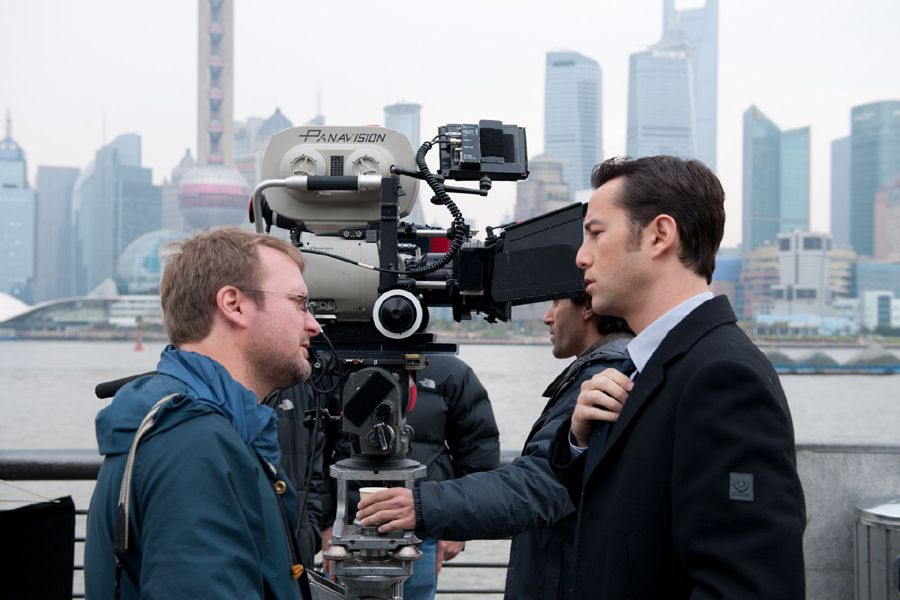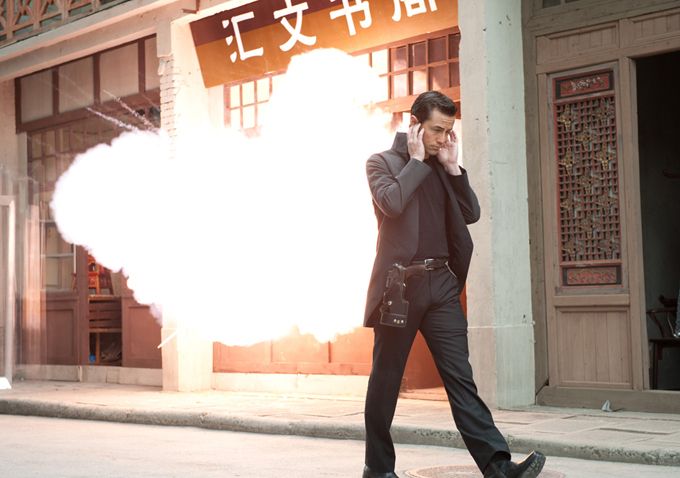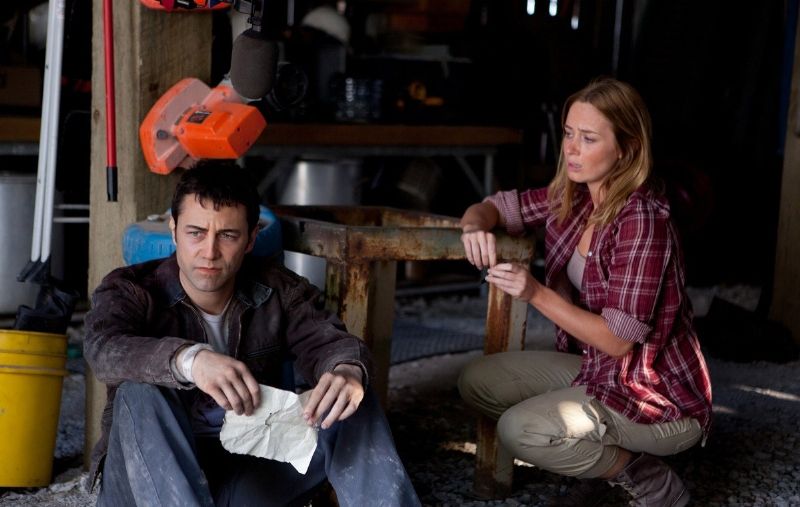Writer/director Rian Johnson’s Brick clearly won the Special Jury Prize for Originality of Vision at the 2005 Sundance Film Festival for a reason: Between his lauded debut and his 2008 follow-up The Brothers Bloom, it’s become clear he isn’t afraid to think outside the box and test his range. And his third film, the upcoming sci-fi thriller Looper, is no exception.
Looper reteams the director with Brick star Joseph Gordon-Levitt -- in fact, Johnson wrote the role of Joe for the actor -- and boasts Bruce Willis as Old Joe (as in, Gordon-Levitt’s character 30 years in the future). Set in 2042 Kansas City, Joe is a contracted hitman, known as a “looper,” who works for the mob to dispose of agents sent back from 2072 (because in the future, getting rid of dead bodies is a tricky business). Looper contracts stipulate that none of their targets escape, but when Joe is faced with closing his loop – killing his future self – Old Joe eludes him, creating a ripple effect of complications. Emily Blunt co-stars as Sara, a mysterious woman Joe meets while in pursuit of his future self.
Looper’s insanely cool concept is backed by Johnson’s trademark ability to weave a character and performance-driven yarn with noir-like flourish and remarkable technical prowess. This was one of our most-anticipated films of the year, and it delivers in spades.
Spinoff Online sat down with the director to discuss Looper’s surprisingly clandestine marketing campaign, the process behind getting Gordon-Levitt’s prosthetics (made to make his features more Willis-like) just right, the film’s lighter moments, the possibility of a musical and much more.
Spinoff: For how seemingly transparent you've been with this film on Twitter and Tumblr throughout shooting and promoting, I was pretty shocked to watch it and realize there's an entire portion that you didn't reveal. It seems like there's a big business lately of spoiling films via marketing and trailers – how did you avoid that?
Rian Johnson: Well, we were in a really unique and nice spot with this where I actually didn't have to fight much for keeping the things secret that we've kept secret, because they are the most unmarketable parts of the movie. And actually, when we were making the film I remember having this talk with Bruce – he was like, "You know, in the trailers they're going to show this and this, but there's no way they'll show this and this. And so people are actually going to go to the theater and be surprised by it." And he was dead on. I'm excited, after it's out, to start talking more about it.
Joe’s embodiment of Bruce is uncanny – especially the voice. But as far as his look, it's an interesting choice you made with Joe’s prosthetics – picking elements of Bruce Willis' face to transpose, because Joe still kind of looks like himself in certain ways. Were there a bunch of trial and error make-up periods where you guys experimented with certain features that just didn't work?
It wasn't a lot; we did some refining. Kazuhiro Tsuji, who is the makeup artist who designed it, he is kind of a wizard. He did life casts of both Bruce and Joe, and so he had plaster heads of them in his studio, and then he went to work sculpting in clay on Joe's face kind of what he would add. So we got to refine it at that stage, but honestly – besides maybe dialing it back a little bit – it wasn't like the scene in Alien: Resurrection where there's all the mutant creatures and you see all the different weird faces. We were fairly limited in how far we could go with it because they are so dissimilar – he kind of hit it pretty close the first time.
So there are no funny test photos of Joe looking a little too much this or a little too much that? Darn!
You know, I have to dig it up – I think the very first make-up test, it was just more pronounced. The nose was too big, it felt a little funky. It was also weird seeing Joe in the make-up not doing the performance, and I guess maybe stills give you a little bit of an idea of that. Because as you say, you can still see a lot of Joe coming through, and as someone who's good friends with him, it was just a bizarre experience.
You didn't have any make-up melting issues under the lights during close-ups?
Oh, this is actually good, this is funny: The scene where he kisses Emily, after a few takes – because they really start going at it, like it's supposed to be this explosion and they're both kissing each other. After a few takes, his nose started coming off. She actually kissed his nose off, which is great!
Bragging rights for Emily now! Speaking of that scene, a few of us who've seen the movie have started championing "click the frog" as a euphemism for a booty call.
That's awesome! [claps] Click the frog! [laughs] If that catches on, I will be so proud!
That's it, we need to hashtag it on Twitter. #ClickTheFrog!
Yes! #ClickTheFrog!
We'll do it once the movie comes out, so people know what it means. Right now everyone is reading this going, "What?"
Right? That makes me really happy. Every time I see it, if that gets a laugh then I know it's a good audience.
Speaking of laughs, I just revisited The Brothers Bloom last night and was talking with some colleagues about it on Twitter, and there's so much love for that movie. It makes us all smile.
Ah, that's great!
I've decided that Rachel Weisz's costumes are "Audrey Hepburn in Charade on Klonopin."
Nice! That's fantastic! [laughs] Oh, my God, that just redefines her look for me!
But more to the point, the diversity of tones and styles with your three films is really quite admirable. After Brick, The Brothers Bloom was so unexpected, and now with Looper we have a whole different side of your vision – this sci-fi, more tonally serious environment. So I'd love to know – what genre do you see yourself tackling next? You're a musician – would you do a musical?
I would love to do a musical some day! Well, Joe has to do a musical – whether I do it with him or not, Joe has to do a musical. He was born to do that.
We saw a glimpse of it in 500 Days of Summer.
A bit of it, but if he did a full-on musical I think he would blow people's minds.
Let's do it!
Doing it, all right, done! Done!
I put the bug in your ear!
Yeah! But in terms of what's next, largely because I also write these things – I'm a pretty slow writer – by the time I get done with a movie, I've been working on it for years and it feels really good to just do something very different. Not that you're sick of it, but in a way you're sick of it. It's like going from the hot tub into the cold bath a little bit. So, that having been said, I'll say with Looper I had such a good time working with the sci-fi elements, the couple things I'm chewing on now – I may actually stick in the sci-fi world. But it would be wildly different than Looper. Like very, very different.
How about a sci-fi musical?
Oh, my God, you're blowing my mind!
What the heck was the last sci-fi musical? Has there even been one? Does Little Shop of Horrors sort of count?
Yeah, that's sci-fi – that's like ‘50s. … God, that's a great movie musical. I love that movie.
I have to admit, I can't really get with the musicals. It's hard for me.
Really? See, I'm a big musical theater fan.
I'd totally watch a musical you made, though.
It's not the sort of thing – I don't think you can really convert people to it. You gotta either fly with it or not, I think.
Eh, well, I can get down with some Baz Luhrmann. I'll watch a little West Side Story.
Any time, are you kidding?
Speaking of musicals, the sound design in your films is really striking. It's pretty clear, based on your attention to detail, that you're from a musical background – you and your brother being musicians, working with your cousin Nathan on your film's scores. But the build and release of tension you use with sound is incredibly effective. How a character enters a scene with sound before they're physically there, the absence of noise, the use of natural elements – it's masterful stuff.
Well, a lot of that is thinking about the sound design while you're planning and writing it and storyboarding it. To me, the Coen Brothers are the ones who … watching their movies, I first became aware of sound design as something that should be as integral to the design of the film as where you're placing the camera or what the sets look like or the costumes. And also, sound design is a storytelling tool. I mean, Barton Fink – watching that film, in college I must've seen that movie, God, maybe 50 times or something ridiculous. I'd always watch it over and over. And the degree to which the storytelling is done through sound – and it's not just something that's layered over, but it's something that's actually integral to what's happening on the screen.
It truly does change your viewing experience. And Looper isn't the most excessively violent film, but it's pretty violent. And I'm bad with violence, I'll admit. There were moments with a colder, cleaner, more hard-boiled bent, and also really disturbing moments that just looked so cool – I had surprising reactions. Paul Dano's scene – I mean, wow. So horrifying, but so creative.
Well, that's the sort of thing that I love where it's incredibly violent in terms of what your mind is projecting onto it, but there's actually no gore at all. It's just very, very clean.
That's sometimes worse.
It's always worse! Always! [laughs] That's always the worst thing!
That's just it – I'm really bad with tension. I can deal with watching someone get shot in the head, but I can't deal with watching someone hold a gun to someone's head.
Ah, well, as someone who's made a movie where a gun is held to a head, I apologize for that! [laughs]
You get a pass, no worries.
In terms of violence in films, generally, I'm not a big fan of it either. I feel like there is violence in certain movies that is exploitative. Like you're supposed to take pleasure from the violence. And the reason that I felt okay having – and the reason I felt it was essential to have – that much violence in this movie was because at the end of the day, the movie really is kind of about violence. It’s about the notion of solving a problem by finding the right person and killing them. And it takes, hopefully, a really hard and clear look at that and ends up kind of on the right side of it. And so it's something that I definitely gave a ton of thought to.
I generally just have to look at the filmmaker, the subject, the actors, etc and say to myself, "Is this worth the stress?"
[laughs] Yeah!
Ironically, I saw on Twitter that you told someone you weren't allowed to see Temple of Doom as a kid, but you saw it as an adult. Well, I saw it as a kid. And that is the movie that broke me – it's the one that gave me this lasting violence complex.
Really? Temple of Doom and pulling the heart out?
Yep. The heart scene!
See, I went and read the novelization as a kid, which is the worst – because it's what you said, it's imagining it and not seeing it. And so I got even worse images!
Looper opens Sept. 28.




